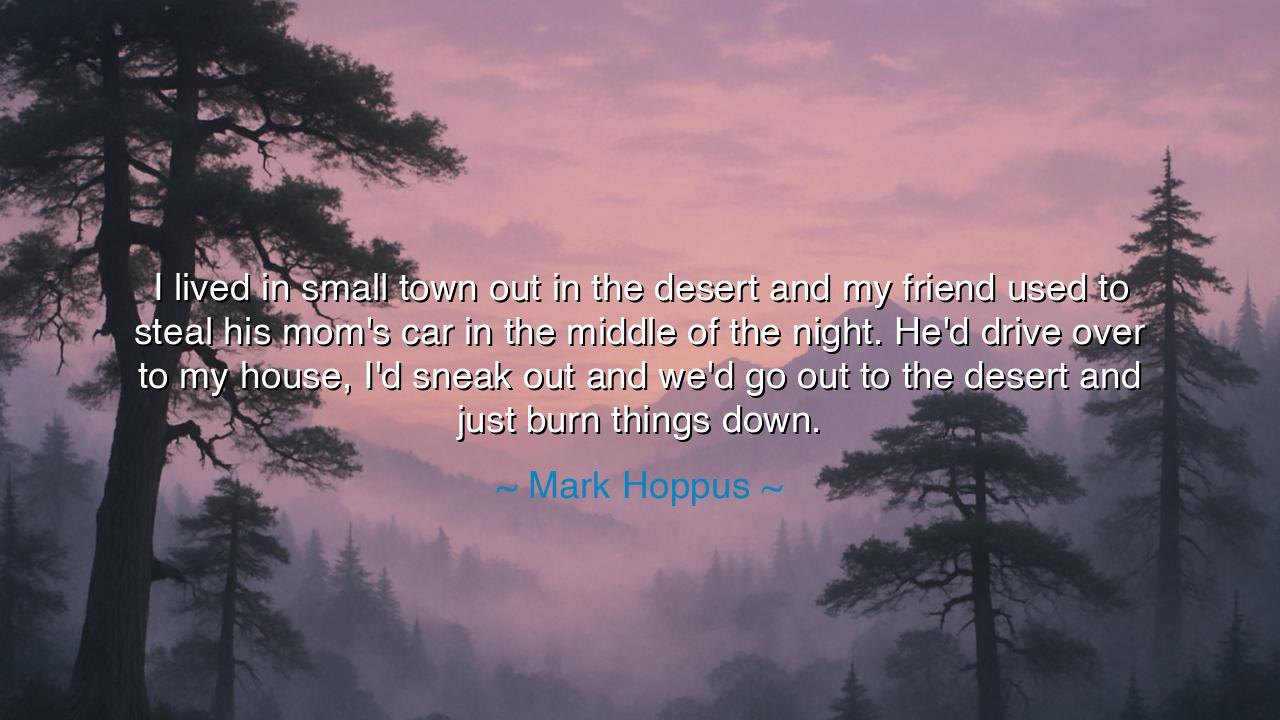
I lived in small town out in the desert and my friend used to
I lived in small town out in the desert and my friend used to steal his mom's car in the middle of the night. He'd drive over to my house, I'd sneak out and we'd go out to the desert and just burn things down.






When Mark Hoppus said, “I lived in a small town out in the desert and my friend used to steal his mom’s car in the middle of the night. He’d drive over to my house, I’d sneak out and we’d go out to the desert and just burn things down,” he was not glorifying destruction, but rather painting the restless portrait of youth—a time when the spirit, untamed and searching, rebels against the silence of ordinary life. His words carry the essence of rebellion, friendship, and the aching desire to feel alive. Beneath the smoke and flames lies a universal truth: that before we learn who we are meant to become, we often test the edges of who we are not.
In the small towns of the world, where time moves slowly and dreams seem far away, young souls often burn with a hunger they cannot name. The desert, vast and empty, becomes both stage and confessional—a place where the boundaries of the world dissolve into the endless sky. For Hoppus, those nights were not merely acts of mischief but rites of passage, expressions of freedom in a landscape of stillness. To “burn things down” was to break the monotony, to feel the rush of danger and creation intertwined. It was the fire of youth trying to find meaning in a world that had not yet revealed its purpose.
The ancients would have understood this. The philosopher Heraclitus once said, “Fire is the origin of all things.” He meant not only the literal flame, but the spark within—the spirit of transformation. Fire destroys, yes, but it also purifies and renews. In myth, Prometheus stole fire from the gods and gave it to mankind, an act of rebellion that brought both suffering and enlightenment. In the same way, the youthful recklessness Hoppus describes is symbolic: before wisdom, there must be wildness; before order, chaos. The fire in the desert was the rehearsal of becoming—the testing of spirit against the vastness of the world.
And yet, his words also carry melancholy. “We’d go out to the desert and just burn things down”—the phrase echoes with emptiness, as though the flames consumed not only wood and brush but the loneliness of youth itself. It is the sadness of those who live too far from the noise of cities, who build their own adventures from the quiet boredom of isolation. There is beauty in that sadness: for in their rebellion, they found companionship; in their destruction, they forged memories that would someday become stories, songs, and reflections of who they once were.
History is filled with the fire of youth that later cooled into wisdom. Consider the painter Caravaggio, whose early life was violent and reckless, filled with brawls and defiance. Yet from that same spirit came his art—raw, alive, burning with light and shadow. The young men who once roamed deserts or cities with rebellion in their hearts often become the creators who teach others how to feel. Mark Hoppus himself would later channel that same fire into music—transforming destruction into melody, chaos into rhythm. This is the alchemy of growth: the reckless boy becomes the reflective artist, and the flame becomes illumination.
The meaning of his quote, then, lies not in the act of destruction but in the journey of awakening. Those nights of fire were not wasted—they were the beginning of understanding that to live fully, one must dare to act, to feel, to risk. In the desert of the human spirit, we all pass through such nights. Some burn with anger, others with longing, but all seek the same light—the sense that life, even for a fleeting moment, is vivid and real.
So, what lesson can we take from his memory? It is this: the fire of youth must someday become the light of purpose. Let your passions burn, but do not let them consume you. Use them to illuminate your path. Every reckless act, every mistake, every wild moment holds a seed of understanding if you are brave enough to look back with honesty. And when you remember your own deserts—those nights when you too “burned things down”—remember that the flames were never just destruction. They were the first signs of life, the first whispers of the spirit learning how to shine.






AAdministratorAdministrator
Welcome, honored guests. Please leave a comment, we will respond soon